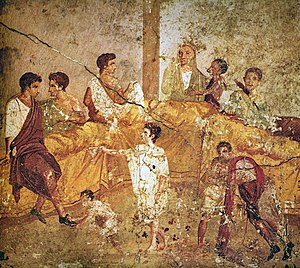
Back Alimentation dans la Rome antique French Ushqimi dhe darka në Perandorinë Romake Albanian Римські бенкети Ukrainian

Food in ancient Rome reflects both the variety of food-stuffs available through the expanded trade networks of the Roman Empire and the traditions of conviviality from ancient Rome's earliest times, inherited in part from the Greeks and Etruscans. In contrast to the Greek symposium, which was primarily a drinking party, the equivalent social institution of the Roman convivium (dinner party) was focused on food. Banqueting played a major role in Rome's communal religion. Maintaining the food supply to the city of Rome had become a major political issue in the late Republic, and continued to be one of the main ways the emperor expressed his relationship to the Roman people and established his role as a benefactor. Roman food vendors and farmers' markets sold meats, fish, cheeses, produce, olive oil and spices; and pubs, bars, inns and food stalls sold prepared food.
Bread was an important part of the Roman diet, with more well-to-do people eating wheat bread and poorer people eating that made from barley. Fresh produce such as vegetables and legumes were important to Romans, as farming was a valued activity. A variety of olives and nuts were eaten. While there were prominent Romans who discouraged meat eating, a variety of meat products were prepared, including blood puddings, sausages, cured ham and bacon. The milk of goats or sheep was thought superior to that of cows; milk was used to make many types of cheese, as this was a way of storing and trading milk products. While olive oil was fundamental to Roman cooking, butter was viewed as an undesirable Gallic foodstuff. Sweet foods such as pastries typically used honey and wine-must syrup as a sweetener. A variety of dried fruits (figs, dates and plums) and fresh berries were also eaten.
Salt, which in its pure form was an expensive commodity in Rome, was the fundamental seasoning and the most common salty condiment was a fermented fish sauce known as garum. Locally available seasonings included garden herbs, cumin, coriander, and juniper berries. Imported spices included pepper, saffron, cinnamon, and fennel. While wine was an important beverage, Romans looked down on drinking to excess and drank their wine mixed with water; drinking wine "straight" was viewed as a barbarian custom.
© MMXXIII Rich X Search. We shall prevail. All rights reserved. Rich X Search